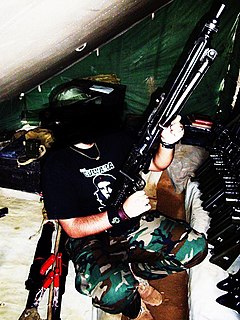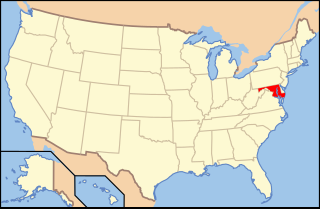Related Research Articles
Gun laws and policies regulate the manufacture, sale, transfer, possession, modification and use of small arms by civilians.

The right to keep and bear arms is a right for people to possess weapons (arms) for the preservation of life, liberty, and property. Only a few countries recognize an individual right to keep and bear arms and protect it constitutionally, with more classifying it as a statutory privilege granted to some segment of the population.

The National Firearms Act (NFA), 73rd Congress, Sess. 2, ch. 757, 48 Stat. 1236 was enacted on June 26, 1934, and currently codified and amended as I.R.C. ch. 53. The law is an Act of Congress in the United States that, in general, imposes an excise tax on the manufacture and transfer of certain firearms and mandates the registration of those firearms. The NFA is also referred to as Title II of the federal firearms laws, with the Gun Control Act of 1968 ("GCA") is Title I.
Firearms in Canada are federally regulated as outlined in the Criminal Law Amendment Act, 1977. Regulation is largely about licensing and registration of firearms, including air guns with a muzzle velocity of more than 500 ft/s or 150 m/s and muzzle energy greater than 4.2 ft⋅lb or 5.7 J.
In the United Kingdom, access by the general public to firearms is subject to some of the strictest control measures in the world. However, fulfilment of the criteria and requirements as laid out by the laws results in the vast majority of firearm licence applications being approved. Laws differ slightly in Northern Ireland due to Northern Ireland having their own Firearms order. Concerns have been raised over the availability of illegal firearms.
Gun laws in Finland incorporate the political and regulatory aspects of firearms usage in the country. Both hunting and shooting sports are common hobbies. There are approximately 300,000 people with hunting permits, and 34,000 people belong to sport shooting clubs. Over 1,500 people are licensed weapons collectors. Additionally, many reservists practice their skills using their own semi-automatic rifles and pistols after the military service.

Gun laws in Pakistan allow for the ownership of firearms in the country by the general population. Pakistan is one of the biggest open firearms markets in the world, and is in the modern era also known for its indigenous gunsmith tradition. The country is famous for producing clones of almost every notable weapon of the world. Although firearms are widely owned, heavy weaponry is only permitted in tribal areas within the province of Khyber Pakhtunkhwa. This includes the circulation of rocket-propelled grenades, short, medium, and long-range rockets, anti-aircraft guns, mortars and other types of firearms.
Gun politics and laws in Mexico covers the role firearms play as part of society within the limits of the United Mexican States. Current legislation sets the legality by which members of the armed forces, law enforcement and private citizens may acquire, own, possess and carry firearms; covering rights and limitations to individuals—including hunting and shooting sport participants, property and personal protection personnel such as bodyguards, security officers, private security, and extending to VIPs.
In South Africa, the Firearms Control Act 60 of 2000 regulates the possession of firearms by civilians. Possession of a firearm is conditional on a competency test and several other factors, including background checking of the applicant, inspection of an owner's premises, and licensing of the weapon by the police introduced in July 2004. The process is currently undergoing review, as the police are at present, not able to adequately or within reasonable time, process either competency certification, new licences or renewal of existing licences. Minimum waiting period used to exceed 2 years from date of application. The Central Firearms Registry implemented a turnaround strategy that has significantly improved the processing period of new licences. The maximum time allowed to process a licence application is now 90 days.
Airsoft is considered to be a modern shooting sport. Airsoft guns themselves are legal in many parts of the world, although some countries, states, and cities have specific restrictions against the items. For example, California State Law states that peoples of all age can use these items, classing them as both tools and toys. Safety regulations in many areas require bright markings on the items. They are officially classed as "soft air devices" or "air compressed toys", depending on the location. For example in the case of Arkansas you must be 18+ to buy an air soft gun.

Concealed carry, or carrying a concealed weapon (CCW), is the practice of carrying a weapon, either in proximity to or on one's person or in public places in a manner that hides or conceals the weapon's presence from the surrounding observers. The opposite of concealed carry is called open carry.
In Germany, access to guns is controlled by the German Weapons Act which adheres to the European Firearms Directive, first enacted in 1972, and superseded by the law of 2003, in force as of 2016. This federal statute regulates the handling of firearms and ammunition as well as acquisition, storage, commerce and maintenance of firearms.
Gun control in Italy incorporates the political and regulatory aspects of firearms usage in the country within the framework of the European Union's Firearm Directive. Different types of gun licenses can be obtained from the national police authorities. According to a 2007 study by The Small Arms Survey Project, the per capita gun ownership rate in Italy is around 12% with an estimated 7 million registered firearms in circulation.

Gun laws in New York regulate the sale, possession, and use of firearms and ammunition in the U.S. state of New York, outside of New York City which has separate licensing regulations. These regulations are relatively strict in comparison to the rest of the United States.
In Honduras, the commerce, ownership, possession and use of firearms is regulated. Escalation in crime and the use of firearms in the commission of crimes and homicides has brought political and public discourse to consider regulation of arms.

Gun laws in Maryland regulate the sale, possession, and use of firearms and ammunition in the U.S. state of Maryland.
Polish law allows firearm ownership under license for people who can provide an important reason. Hunting, sport shooting and collection are the most popular reasons and require membership in a suitable organization. Self-defense, while allowed, requires a proof of threat to life and is rarely allowed. With approximately 2.5 civilian firearms per 100 people, Poland is the 166th most armed country in the world. Only 0.6% of citizens have valid firearm permits.
Lithuanian law allows firearm possession on shall-issue basis. With approximately 13.6 civilian firearms per 100 people, Lithuania is 58th most armed country in the world.
Uruguayan law allows firearm possession on shall-issue basis. With approximately 35 civilian firearms per 100 people, Uruguay is the eighth most armed country in the world and most armed in Latin America.
Austrian law allows firearm possession on shall-issue basis with certain classes of shotguns and rifles available without permit. With approximately 30 civilian firearms per 100 people, Austria is the 14th most armed country in the world.
References
- ↑ "Guatemala — Gun Facts, Figures and the Law". gunpolicy.org.
- 1 2 "One Firearm Seized Every Two Hours in Guatemala". January 17, 2018.
- ↑ REQUISITOS PARA ACTUALIZACIÓN DE REGISTRO DECAM-DIGECAM